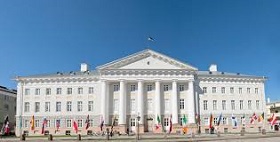Education and Science, Estonia
International Internet Magazine. Baltic States news & analytics
Wednesday, 24.04.2024, 18:15
University of Tartu looking forward to welcoming all admitted intl students
 Print version
Print version |
|---|
The decision concerns all international students admitted to the university this year and new employees from abroad as well as international students and employees already previously enrolled in and hired by the university and about to return to Estonia within the coming few months.
The Estonian government decided at the start of July that arrivals for the purpose of studies and work are permitted from all states; however, citizens and residents from third states where the infection rate is high will be subject to a set of requirements, adherence to which will be the responsibility of the international student or employee as well as the university as the inviting party.
The University of Tartu will inform citizens of third states of the requirements imposed on them for a period of two weeks following their arrival in Estonia. The latter will sign a confirmation declaring that they have acquainted themselves with the requirements and will self-isolate for 14 days and only use separate means of transportation during this time. They will be tested for COVID-19 immediately after their arrival and retested after 14 days of self-isolation. Those exhibiting any symptoms of COVID-19 must immediately turn to a family doctor. The University of Tartu will assist in the organization of transport and testing where needed.
Two-week self-isolation is mandatory for all international students and employees arriving in Estonia from or via a third state not listed on the website of the Estonian Ministry of Foreign Affairs. The same applies to students arriving from or via a state where the number of new COVID-19 positive test results per 100,000 residents has been higher than 16 over the past two weeks, or from or via a state where said data is not available yet the risk of the spread of the virus is high.
During their period of self-isolation, international students and employees must remain in their place of residence and avoid any contacts unless there is an urgent need for it. Leaving one's place of residence is only permitted for seeing a doctor, purchasing food, essentials and medicinal products or in case of an emergency.
Aune Valk, vice rector for academic affairs of the University of Tartu, said that prior to making the decision, the university had consulted Irja Lutsar, professor at the Institute of Biomedicine and Translational Medicine of the University of Tartu, according to whom the society needs to learn how to live with the virus.
"Choosing to enroll in a university is a long-term decision as the studies span for at least two years and in this context, a two-week period of self-isolation is not an unrealistic effort. Due to our readiness to start e-learning in the fall, students will have more time to arrive in Estonia and the university, too, will have somewhat more time to prepare for their arrival. We cannot be completely certain that nothing will happen as the virus might as well spread among Estonian students, but I believe that the case of the Raatuse student residence hall equipped us with the knowledge of how the spread of the virus can be curbed locally with clear rules and systematic housing arrangements," Valk said.
Ulle Tensing, head of the University of Tartu's study abroad center, said that the university has admitted over 500 international students this year.
"Considering the global situation, likely only one-third to half of those admitted this year will arrive. It is difficult to say how many students will be subject to the isolation requirement as the university is also expecting the return of students who have been enrolled previously and are at present staying abroad," Tensing said.
Tensing deems it important that as many international students as possible should be able to start their studies together with Estonian students in the fall.
"The organization of testing and isolation will be an additional burden for the university, but openness must also be preserved in difficult times. International students and employees are an important part of our academic community," she said.
- 30.12.2020 Business Education Plus предлагает анонсы бизнес-обучений в январе-феврале 2021 года
- 29.12.2020 Number of new companies registered in Estonia up in 2020
- 29.12.2020 18-19 января Наталия Сафонова проводит семинар "Управленческий учет во власти собственника"
- 28.12.2020 Рынок недвижимости Эстонии осенью начал быстро восстанавливаться
- 28.12.2020 Tartu to support students' solar car project
- 28.12.2020 Новогодняя распродажа курсов Школы SMM Дамира Халилова
- 28.12.2020 Owner of Kunda Nordic Tsement to install full-scale CCS facility in Norway
- 23.12.2020 В 2019 году выросли прибыль и оборот Eesti Pagar
- 23.12.2020 Flying Forward 2020 starts developing air mobility of cities
- 22.12.2020 Movement of parcels between Estonia, UK suspended until New Year; Lithuanian Post warns of delays








 «The Baltic Course» Is Sold and Stays in Business!
«The Baltic Course» Is Sold and Stays in Business!

